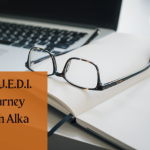
What can ally-ship and solidarity look like?
Dear readers, and friends…
In many ways, and for many sectors, including in the case of the not-for-profit world, June is a time that signifies year-end. The school year too is winding down, with time to look forward with excitement, to summertime activities, like, drives to cottage country, camping and trekking trips, perhaps travels to visits with family and friends. For the team at CMCCF too, as we wind down the activities that we had planned for and executed during the first year of the J.E.D.I Initiative, it’s also an opportunity to look at the road ahead and think about where it might lead us in our second year.
Practicing Gratitude and Reflection…
We are in a bit of an in-between space then, and such a time seems perfect to take a pause-for expressing gratitude and for indulging in some reflections. Firstly, we thank our readers, partners and our allies for staying with us on the J.E.D.I. ride; our appreciation also goes out to the community members who participated in CMCCF activities and joined the often messy but intimate conversations we’ve had. We certainly hope and wish for enhanced engagement on the part of all our readers and community members, so that, through listening carefully and deeply, with our hearts and minds open, we may feel safe speaking with each other and build relationships of mutual understanding and solidarity.
We’ve certainly learnt a great deal from all the thoughtful story-sharing from members of our team, both when they bring voice to their own experiences, and also those they’ve heard from cultural communities with whom they work closely. Also, the stories we’ve heard more directly, from members of cultural communities, during engagement sessions, panels, and other conversation-forums- these further reiterate the lack of equity and the entrenched nature of discrimination and racism that still persists and pervades systems; and is felt by people who interact with them, for instance in contexts like health-care or in law enforcement.
Oftentimes these biases are unconscious-but surely that kind of excuse cannot be acceptable with the kind of EDI (Equity, Diversity, Inclusion), or DEI (Diversity, Equity, Inclusion) training we’ve all had, especially during our pandemic times. We must then be mindful of each other’s needs as well as our attitudes and behaviours towards our fellow beings; and we must take charge of the responsibility to educate ourselves, and learn to be more respectful towards each other.
For instance, if certain individuals, groups, or communities are experiencing challenges and obstacles- like language barriers, cultural misunderstandings, stereotypical behaviours, or direct incidents of racism and discrimination-there should be awareness-building around what they might do, and how we might access support for ourselves and be able to care for each other.
Muddy Waters: Are Biases Individual or are they Systemic?
It is also true that experiences of marginalization and othering do not always come to us directly or clearly from other `individuals’ per se, but are baked into policies, practices and processes, and they show up as blind spots and a tone-deafness in the interactions we may have with service providers during service provision; or it may simply be a lack of basic knowledge of the realities of each other’s lives that creates these obstacles to mutual understanding.
One of the core areas of focus of our work at CMCCF is to engage with diverse cultural communities, with the objective of understanding what their lived experiences are-of accessing services, and of interacting within their own communities, and with communities other than their own.
The long-term goal of pursuing the above objectives is to come to a place of mutual understanding, so that conflicts can be minimised and opportunities to share resources and learn from each other are expanded and optimised.
Finding Common Ground
This can only happen once we can see both the ways in which communities (and individuals within communities) are unique, and different from each other, but also what our shared commonalities are.
Upon such a foundation of shared hopes and aspirations, as well as an understanding of barriers and resources, can meaningful relationships of support be fostered. In other words, it would be helpful if the processes of community engagement can help us develop understanding about our common goals and aspirations-including a good sense of the challenges we all face- that could be a way for individuals and communities to move forward together; going beyond differences that separate us, to build on shared abilities and resources, with the goal of helping and supporting each other.
The questions to ask then, could be- what can solidarity or ally-ship look like; and how can it be actualised through implementation; what are the barriers to actualizing it; and might we try to work around those?
Impacts of Inequity and Exclusion
As a part of the CMCCF mandate, we’re also always keen to learn how experiences of inequity and exclusion, as well as discrimination and racism are especially impacting racialized people, cultural communities, and indigenous groups as well as those disadvantaged-based on other factors like disability, sexual preference, and other forms of exclusion.
Big questions may spring from the above discussion, for example: How do these experiences make people feel emotionally; do they negatively impact their sense of self and of belonging, and do they affect their capacity to experience well-being; and what resources do they have at their disposal to understand these adverse experiences and to cope with them?
As you perhaps are aware, June was a month full of many notable and symbolic moments that can help us build awareness of the histories and ground realties of several diverse groups of peoples.
June is celebrated as National Indigenous History Month in Canada; June is LGBTQ+ Pride Month too; June 20 was also World Refugee Day too, designated by the United Nations globally to honour refugees and others forced to flee their homelands.
While celebrations are important as are occasions to mark the noteworthy achievements of members among all these population groups; it is perhaps more important to ensure that special events and policy initiatives do not remain symbolic and performative; but that our understanding of shared vulnerabilities of those discriminated against remains strong, and that we continue to care and advocate for our fellow human beings.
Practising solidarity and being an ally can come in many forms, and we can each figure it out for ourselves if we believe in the importance of such a task, and how we might engage in thinking about and `doing’ around such a topic.
My apologies for bringing up a somewhat difficult conversation theme!
We will talk and engage more when we come back together-with renewed energies- in September.
Do share your thoughts and feelings on the CMCCF social media platforms, and LinkedIn; do these topics resonate with you; do you have thoughts and preferences about others that we might talk about, that are significant to you?
Meanwhile, all you lovely people, be well, and make the most of the beautiful summer ahead…

The views expressed in this blog post are mine, and I take full responsibility for them. We are always wanting to hear from you – please share your thoughts and feedback by completing our contact form here or by emailing hello@cmccfamilies.ca.
To learn more about our Intercultural and Intergenerational Diversity and Inclusion Engagement Project, go to our J.E.D.I. Initiative landing page here.

 Previous Post
Previous Post